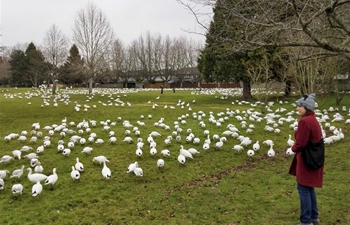MOMBASA, March 7 (Xinhua) -- Scientists from an international maize research organization said Thursday that a deadly maize disease that has ravaged farms across eastern Africa since 2011 has been contained.
Boddupalli Prasanna, director of global maize program at the International Maize and Wheat Improvement Center, said the maize lethal necrosis disease (MLN) is under control in the region but not eradicated.
"We have managed to contain the spread of the disease within the region but continue to monitor its movements," Prasanna told a pan-African seed congress in Kenya's coastal city of Mombasa.
He attributed the success to collaborative efforts from governments, farmers and research institutions in the region.
A survey conducted in late 2018 in eastern and southern Africa showed that there was no MLN in Malawi, Mozambique, Zimbabwe and Zambia, Prasanna said
"Tackling the MLN has been a challenge in the continent, but so far the success has been achieved through integration of various components," he added.
The scientist said incidence of the disease is falling in Kenya but continues to spread to other regions in Uganda.
Prasanna called on governments and partners to step up awareness in western and northern Africa.
The disease "moves so fast and it is difficult to predict where it will be spotted next, hence the need to intensify awareness amongst the farmers," he added.
Prasanna said an array of new measures, including the use of legumes to stop growing maize crop for at least two months, need to be taken to keep the disease away from the farms.
According to scientist, some 30 elite lines converted into MLN resistant versions, 15 MLN-tolerant hybrids have been released in Kenya, Tanzania and Uganda, and an additional five hybrids are now under commercialization.
The varieties have been developed at an MLN screening facility in Naivasha, south-central Kenya.
Prasanna said that since 2014, researchers at the center have screened 175,173 germplasm from the center, regional research institutions and private seed companies.
"Most of the germplasm that were screened between 2014 and 2018 were found resistant to MLN," he said.
Prasanna said the same effort against MLN need to be applied in the management of fall armyworm that is equally threatening maize species in the continent.












